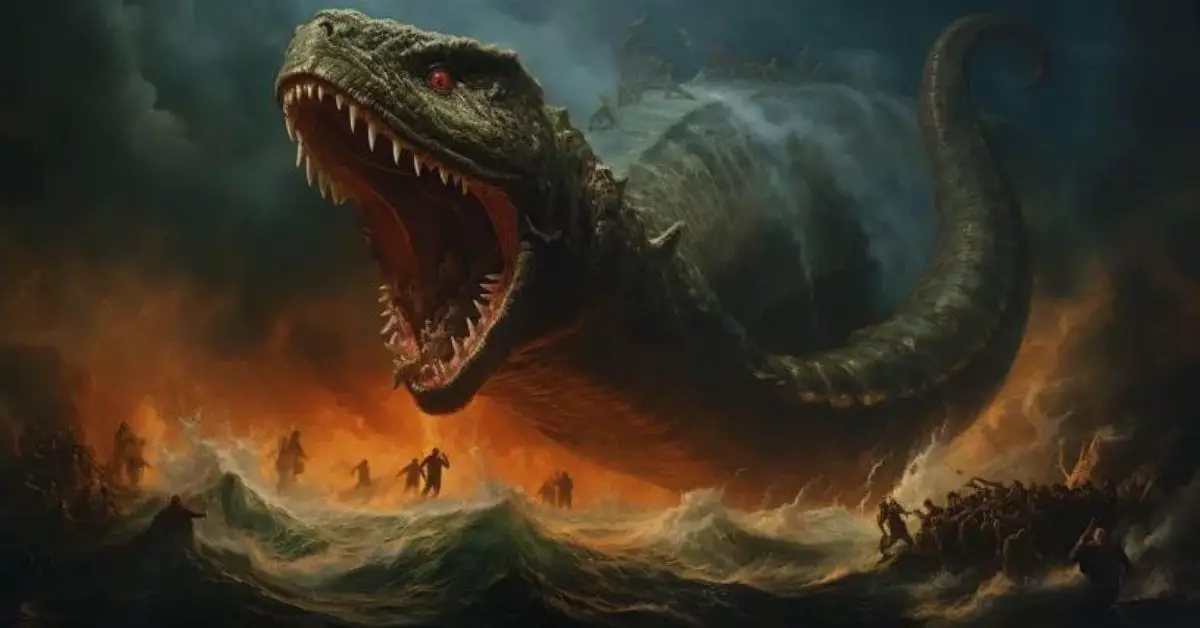In the Bible, Leviathan is depicted as a powerful and fearsome sea creature, symbolizing chaos and evil. Mentioned in several books, it represents God’s power over all creation, including the most formidable forces. Leviathan is used metaphorically to demonstrate that nothing is beyond God’s control.
Intrigued by the biblical references to Leviathan? It’s a symbol of chaos tamed by God’s power.
What Does the Bible Say About Leviathan?
Leviathan in the Bible is a fascinating and complex symbol. It appears in various contexts, often representing chaos, strength, and opposition to God, but ultimately under His dominion.
In the Old Testament, particularly in the book of Job, Leviathan is described as a formidable creature, embodying chaos and strength. The detailed description in Job points to a creature beyond human control, symbolizing the untamable aspects of the natural world.
This depiction of Leviathan is not just about a physical creature but carries deeper symbolic meaning. In the ancient Near Eastern context, sea monsters like Leviathan often represented chaos and evil. The Bible uses this imagery to convey the idea of chaos and evil being under God’s control.
Leviathan is also mentioned in Psalms and Isaiah. In Psalms, it is a part of the creation that God has made and over which He has authority. In Isaiah, the defeat of Leviathan symbolizes God’s ultimate victory over chaos and evil forces.
The metaphorical use of Leviathan in the Bible speaks to God’s power and sovereignty. It’s a reassurance that no matter how chaotic or challenging circumstances might seem, they are not beyond God’s control or purposes.
In the New Testament, while Leviathan is not directly mentioned, the theme of God’s victory over evil and chaos is prevalent. Through Christ’s life, death, and resurrection, the New Testament depicts the ultimate defeat of evil and the establishment of God’s kingdom.
Overall, the biblical references to Leviathan offer a rich tapestry of symbolism about God’s power over chaos and evil. It reassures believers that even the most daunting forces of nature or spiritual challenges are within God’s sovereign control.
Bible Verses About Leviathan
- Job 41 – The entire chapter is a description of Leviathan, highlighting its strength and the impossibility of taming it. It’s used to illustrate God’s power over even the most formidable creatures.
- Psalm 74:14 – “You crushed the heads of Leviathan and gave it as food to the creatures of the desert.” This verse reflects on God’s victory over Leviathan, symbolizing His power over chaos.
- Psalm 104:26 – “There the ships go to and fro, and Leviathan, which you formed to frolic there.” This portrays Leviathan as part of God’s creation, showing that it is under His authority.
- Isaiah 27:1 – “In that day, the Lord will punish with his sword—his fierce, great and powerful sword—Leviathan the gliding serpent, Leviathan the coiling serpent; he will slay the monster of the sea.” This prophecy speaks of God’s ultimate defeat of Leviathan, symbolizing the end of chaos and evil.
- Revelation 12:9 (New Testament) – While not mentioning Leviathan directly, this verse speaks of the “great dragon” being cast out, which parallels the Old Testament imagery of God defeating sea monsters and chaos.
- Psalm 89:10 – “You crushed Rahab like one of the slain; with your strong arm, you scattered your enemies.” The term Rahab, often synonymous with Leviathan, reinforces the theme of God’s triumph over chaotic forces.
- Amos 9:3 – Though not mentioning Leviathan by name, this verse’s reference to the “serpent in the sea” can be interpreted symbolically in a similar vein, representing evil forces subdued by God.
- Job 3:8 – “May those who curse days curse that day, those who are ready to rouse Leviathan.” This obscure reference again places Leviathan in a context of something formidable and fearsome.
- Ezekiel 29:3-5 – This passage, while speaking of the Pharaoh of Egypt, uses imagery similar to Leviathan, symbolizing the defeat of powerful, oppressive forces.
- Job 26:12-13 – “By his power he churned up the sea; by his wisdom he cut Rahab to pieces. By his breath the skies became fair; his hand pierced the gliding serpent.” This is another metaphorical reference to God’s victory over chaotic forces, akin to the symbolism of Leviathan.
- Psalm 18:16 – “He reached down from on high and took hold of me; he drew me out of deep waters.” While not directly mentioning Leviathan, this verse metaphorically speaks of God’s rescue from chaotic forces, akin to the imagery of tumultuous seas and sea monsters.
- Psalm 91:13 – “You will tread on the lion and the cobra; you will trample the great lion and the serpent.” Again, while not directly about Leviathan, this verse symbolizes triumph over dangerous and chaotic forces, aligning with the theme of God’s sovereignty over chaos represented by Leviathan.
- Isaiah 51:9 – “Was it not you who cut Rahab to pieces, who pierced that monster through?” This verse again draws upon the imagery of sea monsters, similar to Leviathan, to depict God’s power over chaotic and destructive forces.
- Revelation 20:2 (New Testament) – “He seized the dragon, that ancient serpent, who is the devil, or Satan, and bound him for a thousand years.” Similar to Leviathan, this dragon symbolizes chaos and evil, subdued by God’s power.
- Job 9:13 – “God does not restrain his anger; even the cohorts of Rahab cowered at his feet.” This reference to Rahab, a term often associated with Leviathan, further illustrates the concept of chaotic forces being under God’s control.
These verses collectively paint a picture of Leviathan as a symbol of chaos, danger, and opposition to God, ultimately subdued by His power. The Bible uses the imagery of Leviathan to reassure believers of God’s sovereignty over all aspects of creation, including the most chaotic and seemingly uncontrollable forces.


